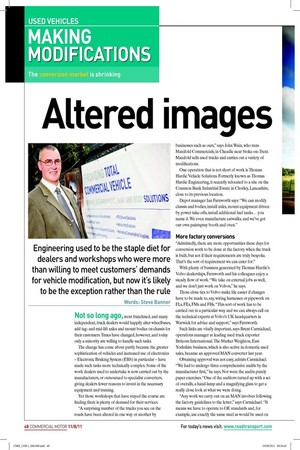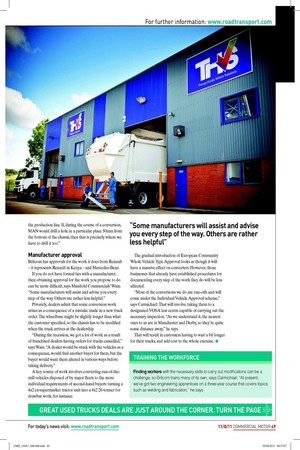Altered images
Page 43

Page 44

If you've noticed an error in this article please click here to report it so we can fix it.
Engineering used to be the staple diet for dealers and workshops who were more than willing to meet customers’ demands for vehicle modification, but now it’s likely to be the exception rather than the rule
Words: Steve Banner Not so long ago, most franchised, and many independent, truck dealers would happily alter wheelbases, add tagand mid-lift axles and mount bodies on chassis for their customers. Times have changed, however, and today only a minority are willing to handle such tasks.
The change has come about partly because the greater sophistication of vehicles and increased use of electronics – Electronic Braking System (EBS) in particular – have made such tasks more technically complex. Some of the work dealers used to undertake is now carried out by the manufacturers, or outsourced to specialist converters, giving dealers fewer reasons to invest in the necessary equipment and training.
Yet those workshops that have stayed the course are inding there is plenty of demand for their services.
“A surprising number of the trucks you see on the roads have been altered in one way or another by businesses such as ours,” says John Wain, who runs Manifold Commercials, in Cheadle near Stoke-on-Trent. Manifold sells used trucks and carries out a variety of modiications.
One operation that is not short of work is Thomas Hardie Vehicle Solutions. Formerly known as Thomas Hardie Engineering, it recently relocated to a site on the Common Bank Industrial Estate in Chorley, Lancashire, close to its previous location.
Depot manager Ian Farnworth says: “We can modify chassis and bodies, install axles, mount equipment driven by power take-offs, install additional fuel tanks... you name it. We even manufacture catwalks, and we’ve got our own paintspray booth and oven.”
More factory conversions
“Admittedly, there are more opportunities these days for conversion work to be done at the factory when the truck is built, but not if their requirements are truly bespoke. That’s the sort of requirement we can cater for.” With plenty of business generated by Thomas Hardie’s Volvo dealerships, Farnworth and his colleagues enjoy a steady low of work. “We take on external jobs as well, and we don’t just work on Volvos,” he says.
Those close ties to Volvo make life easier if changes have to be made to, say, wiring harnesses or pipework on FLs, FEs, FMs and FHs. “This sort of work has to be carried out in a particular way and we can always call on the technical experts at Volvo’s LJK headquarters in Warwick for advice and support,” says Farnworth.
Such links are vitally important, says Brent Carmichael, operations manager at leading used truck exporter Britcom International. The Market Weighton, East Yorkshire business, which is also active in domestic used sales, became an approved MAN converter last year.
Obtaining approval was not easy, admits Carmichael. “We had to undergo three comprehensive audits by the manufacturer irst,” he says. Nor were the audits purely paper exercises. “One of the auditors turned up with a set of overalls, a hand-lamp and a magnifying glass to get a really close look at what we were doing.
“Any work we carry out on an MAN involves following the factory guidelines to the letter,” says Carmichael. “It means we have to operate to OE standards and, for example, use exactly the same steel as would be used on the production line. If, during the course of a conversion, MAN would drill a hole in a particular place 50mm from the bottom of the chassis, then that is precisely where we have to drill it too.”
Manufacturer approval
Britcom has approvals for the work it does from Renault – it represents Renault in Kenya – and Mercedes-Benz.
If you do not have formal ties with a manufacturer, then obtaining approval for the work you propose to do can be more dificult, says Manifold Commercials’ Wain. “Some manufacturers will assist and advise you every step of the way. Others are rather less helpful.” Privately, dealers admit that some conversion work arises as a consequence of a mistake made in a new truck order. The wheelbase might be slightly longer than what the customer speciied, so the chassis has to be modiied when the truck arrives at the dealership.
“During the recession, we got a lot of work as a result of franchised dealers having orders for trucks cancelled,” says Wain. “A dealer would be stuck with the vehicles as a consequence, would ind another buyer for them, but the buyer would want them altered in various ways before taking delivery.” A key source of work involves converting run-of-themill vehicles disposed of by major leets to the more individual requirements of second-hand buyers: turning a 4x2 ex-supermarket tractor unit into a 6x2 26-tonner for drawbar work, for instance. The gradual introduction of European Community Whole Vehicle Type Approval looks as though it will have a massive effect on converters. However, those businesses that already have established procedures for documenting every step of the work they do will be less affected.
“Most of the conversions we do are one-offs and will come under the Individual Vehicle Approval scheme,” says Carmichael. That will involve taking them to a designated VOSA test centre capable of carrying out the necessary inspection. “As we understand it, the nearest ones to us are in Manchester and Derby, so they’re quite some distance away,” he says.
That will result in customers having to wait a bit longer for their trucks, and add cost to the whole exercise. ■
TRAINING THE WORKFORCE
Finding workers with the necessary skills to carry out modifications can be a challenge, so Britcom trains many of its own, says Carmichael. “At present, we’ve got two engineering apprentices on a three-year course that covers topics such as welding and fabrication,” he says.














































